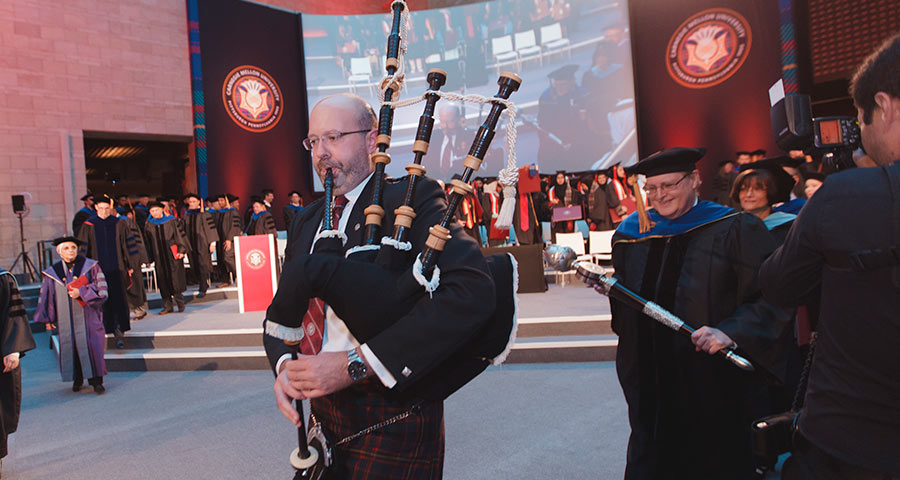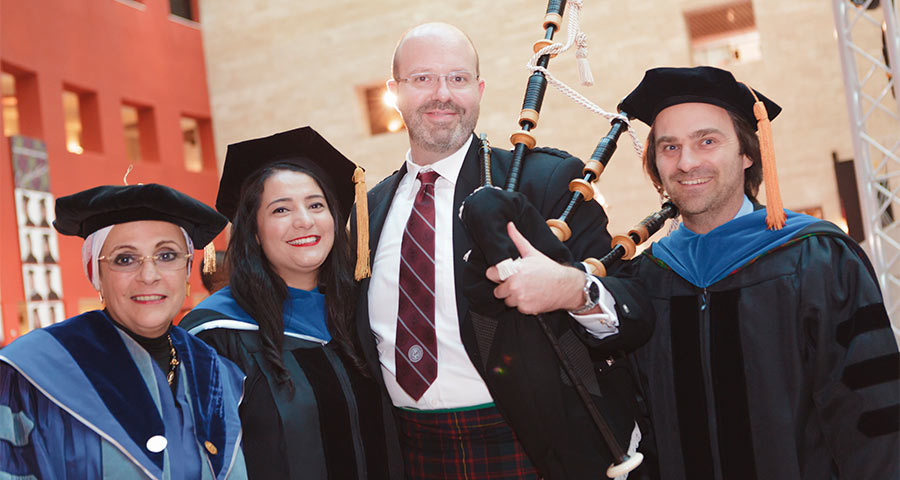
When the Battle is O’er: John Gasper talks about bagpipes and the culture of CMU
On May 1, 2017, after the graduates take their places on the stage, there will be a pause, and then the air will fill with the reedy strains of bagpipes. The piper is John Gasper, associate teaching professor of economics, and he will lead the procession of faculty members and special guests into CMU-Q’s tenth graduation ceremony.
CMU-Q News sat down with John Gasper to learn how a student of logic and economics, with no Scottish heritage, became a living link to the tradition of bagpipes at Carnegie Mellon.
What is your connection to Carnegie Mellon University?
All three of my degrees—my bachelor’s, master’s and PhD—are from Carnegie Mellon. I finished my PhD in 2008, and then came to CMU-Q in August of 2010.
How did you learn about the connection between CMU and the bagpipes?
When I was a freshman in the late ‘90s, the Carnegie Mellon Pipes and Drums ensemble practiced every Monday at sunset on The Cut. There were 10 or 15 pipers, plus the drum line, so they made a big sound. You could hear it everywhere, inside and outside. It’s part of the culture of Carnegie Mellon.
Did you play the bagpipes before you came to CMU?
No, not at all.
So how did you learn to play them?
At the beginning of my sophomore year, I noticed a sign-up sheet for students who wanted to learn bagpipes. There was a rumor that if you played bagpipes, you could attend CMU for free.
Is that true?
No, but you could get bagpipe lessons for free. I signed up.
I imagine it is a difficult instrument to learn to play.
Musically, it is a simple instrument with only nine notes. It is physically difficult to make a noise—it takes a lot of diaphragmatic strength to fill the bag with air. When you need to take a breath, you maintain the air pressure by squeezing the bag with your elbow, so you have a tricky interplay between your lungs and elbow.
How long does it take to learn?
You start by just using the recorder-like part of the pipes, called the chanter. Then you memorize the songs, since bagpipers usually play while they are marching. Then you learn the transitions, since the songs are pretty short and we often will string a few of them together. Eventually you learn how to use the bag. It takes about a year before you are able to put all the pieces together.
Who taught you?
I was extremely fortunate to learn from two amazing pipers. Jimmy McIntosh helped Carnegie Mellon incorporate bagpipes as a major, which at the time was one of the only places in the world where you could study bagpipes at a bachelor’s degree level. Then Alasdair Gillies became director of the Carnegie Mellon Pipes and Drums. He was an incredible piper, one of the world’s best, and he led the piping program for more than a decade. Sadly, he passed away in 2011.
Did you play for CMU during grad school?
I did. It’s a close-knit group, and a lot of alumni stay in the band and keep playing.
When did you first play in Doha?
I joined CMU-Q in August of 2010, and I played for my first graduation here in May 2011. I have played for a few convocations, and nearly every graduation ceremony since. I also played at the Ten-Year Celebration in front of Sheikha Moza, which was an honor.
Where do you practice? I bet it’s hard to play in the heat.
When the weather is cool enough, I practice outside in the area between CMU-Q and Texas A&M. I feel like it brings a little of the tradition of playing in The Cut to Doha. When it’s hot, I have a special spot in the loading dock. It’s a very loud instrument, and unlike other instruments, there are no dynamics. You can’t play softly, and you can’t pause or stop during the song.
Do you have certain songs you play at graduation?
I do. The songs are pretty short, so I play a medley so the music continues until everyone walks in. Usually I lead the faculty procession with “Crags of Tumbledown Mountain” and “The Old Rustic Bridge.” During the recessional, I play “The Green Hills of Tyrol” and “When the Battle is O’er.”
“When the Battle is O’er” sounds like a good song title for graduation!
It is a fitting title, especially as a faculty member.
Learn more about Graduation 2017.

